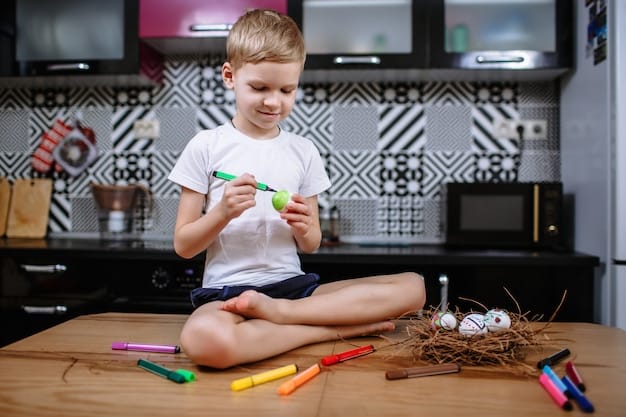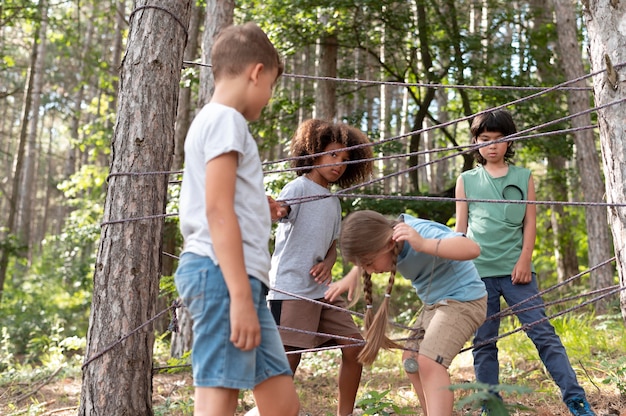Unlock Creativity: The Unexpected Benefits of Boredom in Children

The Unexpected Benefits of Boredom: How Unstructured Time Fuels Creativity in Children explores how allowing kids downtime to be bored can actually be a powerful catalyst for imagination, problem-solving, and independent thinking, fostering crucial developmental skills.
In today’s hyper-scheduled world, the idea of letting kids be bored might seem counterintuitive. However, embracing the unexpected benefits of boredom: how unstructured time fuels creativity in children, can unlock a world of imagination and resourcefulness.
The surprising science of boredom and the creative mind
Boredom is often viewed as a negative emotion, something to be avoided at all costs. However, research suggests that boredom plays a crucial role in cognitive development, specifically in fostering creativity. Understanding the unexpected benefits of boredom: how unstructured time fuels creativity in children can change our perspective on how kids spend free time.
The link between boredom and imagination
When children are constantly entertained, their minds are passively receiving information. Boredom forces them to actively seek stimulation, leading to imaginative play and creative problem-solving.
Boredom as a catalyst for divergent thinking
Divergent thinking involves generating multiple solutions to a problem. Boredom encourages children to explore different possibilities and think outside the box, strengthening their divergent thinking skills.
- Promotes self-reflection: Boredom provides an opportunity for kids to reflect on their thoughts and feelings.
- Encourages problem-solving: Children learn to find solutions to their own boredom, fostering resilience.
- Sparks curiosity: Boredom can drive children to explore new interests and hobbies.
- Enhances emotional regulation: Learning to cope with boredom builds emotional resilience and self-control.
In essence, boredom is not a void to be filled, but a space for the mind to wander, explore, and create. This concept underscores the unexpected benefits of boredom: how unstructured time fuels creativity in children. By allowing children to experience boredom, we are giving them a valuable opportunity to develop crucial life skills.

How unstructured time fuels creativity in children
The constant stimulation of modern life can stifle creativity. Unstructured time, free from scheduled activities and digital devices, provides the space for children to tap into their inner resources and develop creative solutions. Embracing the unexpected benefits of boredom: how unstructured time fuels creativity in children, we allow kids to explore their creative capabilities without boundaries.
The value of free play
Free play, driven by a child’s own imagination rather than external rules or instructions, is essential for developing creativity and problem-solving skills.
Creating a boredom-friendly environment
Parents can foster creativity by providing a safe and supportive environment where children feel comfortable exploring their interests and ideas.
- Limit screen time: Reduce the amount of time spent on electronic devices to encourage other activities.
- Provide open-ended toys: Offer toys that inspire imagination, such as blocks, art supplies, and dress-up clothes.
- Encourage outdoor exploration: Nature provides countless opportunities for imaginative play and discovery.
- Resist the urge to intervene: Allow children to figure out how to entertain themselves without constant guidance.
Giving children unstructured time allows them to develop their own interests and passions, which in turn enhances creativity. This facet is fundamental to acknowledging the unexpected benefits of boredom: how unstructured time fuels creativity in children. Parents should resist the urge to fill every moment with activities, and instead, provide space for boredom to work its magic.
Boosting problem-solving skills through boredom
Boredom can also be a powerful tool for teaching children how to solve problems independently. When faced with nothing to do, children are forced to come up with their own solutions, strengthening their problem-solving abilities. Highlighting the unexpected benefits of boredom: how unstructured time fuels creativity in children, we equip kids with tools to navigate real-world challenges.
Boredom as a motivation for innovation
Necessity is the mother of invention, and boredom can be a similar motivator, prompting children to find innovative ways to entertain themselves.
The importance of independent thinking
When children are constantly directed, they may struggle to think for themselves. Boredom encourages independent thinking and self-reliance.
- Fosters critical thinking: Children learn to analyze situations and come up with their own solutions.
- Builds resilience: Overcoming boredom teaches children to persevere in the face of challenges.
- Develops self-confidence: Solving their own problems helps children build confidence in their abilities.
Problem-solving is an essential skill in all aspects of life, and boredom provides a unique opportunity for children to practice and develop this skill. This element reinforces the unexpected benefits of boredom: how unstructured time fuels creativity in children. By resisting the urge to solve their children’s boredom for them, parents can help them become more resourceful and independent individuals.
The role of boredom in emotional development
Learning to cope with boredom is an important part of emotional development. Boredom provides an opportunity for children to develop self-awareness, emotional regulation, and resilience. By recognizing the unexpected benefits of boredom: how unstructured time fuels creativity in children, we enable emotional health in our children.
Developing self-awareness through boredom
Boredom gives children the space to reflect on their own thoughts and feelings, leading to greater self-awareness and emotional intelligence.
Emotional regulation and boredom
Learning to manage feelings of boredom can help children develop emotional regulation skills, teaching them to cope with uncomfortable emotions in healthy ways.
- Enhances self-control: Children learn to delay gratification and manage impulses.
- Promotes mindfulness: Boredom can encourage children to be present in the moment and appreciate simple pleasures.
- Develops empathy: Reflecting on their own emotions can help children better understand and empathize with others.
Emotional development is just as crucial as cognitive development, and boredom plays a vital role in this process. It supports the unexpected benefits of boredom: how unstructured time fuels creativity in children. By allowing children to experience boredom, parents can help them develop the emotional skills they need to thrive.

Practical ways to encourage boredom and creativity
While the idea of embracing boredom may seem daunting, there are practical steps parents can take to encourage it and foster creativity. These steps are essential to realizing the unexpected benefits of boredom: how unstructured time fuels creativity in children.
Limit screen time effectively
Setting limits on screen time is one of the most effective ways to create space for boredom and encourage other activities. Balance is essentiel.
Provide open-ended toys and materials
Offer toys and materials that inspire imagination, such as building blocks, art supplies, recycled materials, and dress-up clothes.
Embrace outdoor exploration and nature
Encourage outdoor play and exploration, as nature provides endless opportunities for creativity and discovery.
- Establish tech-free zones: Designate certain times or areas of the house as tech-free zones.
- Plan unstructured time: Schedule time each day or week for free play and creative activities.
- Encourage hobbies and interests: Support your child’s passions and provide opportunities for them to pursue them.
By implementing these practical strategies, parents can create an environment that fosters boredom and encourages the development of creativity. Remember, creating the unexpected benefits of boredom: how unstructured time fuels creativity in children just requires a little deliberate adjustment of schedule and attitude.
Reframing your mindset about boredom
Ultimately, embracing the benefits of boredom requires a shift in mindset. Parents need to view boredom not as a problem to be solved, but as an opportunity for growth and development. Redefining the unexpected benefits of boredom: how unstructured time fuels creativity in children can drastically change how we parent.
Challenge negative beliefs about boredom
Examine your own beliefs about boredom and challenge any negative assumptions you may have. Do not see it as wasted time.
Trust in your child’s abilities
Believe in your child’s ability to find their own solutions and entertain themselves. All children are different, but have a creative well inside.
- Be patient: It may take time for your child to adjust to having more unstructured time.
- Offer support, not solutions: Provide encouragement and resources, but let your child take the lead.
- Celebrate creativity: Acknowledge and appreciate your child’s creative efforts, no matter how small.
Making this mental shift can have a profound impact on how you approach parenting and how your children develop their own creativity and resourcefulness. These aspects are essential to completely acknowledge the unexpected benefits of boredom: how unstructured time fuels creativity in children.
| Key Point | Brief Description |
|---|---|
| 🎨 Unstructured Time | Provides space for creativity and imagination to flourish. |
| 🧠 Problem-Solving | Boredom drives kids to find independent solutions and innovate. |
| 🌱 Emotional Growth | Helps children develop self-awareness and emotional regulation. |
| 📵 Limit Screen Time | Encourages alternative activities and fuels imaginative play. |
Frequently Asked Questions about the benefits of boredom for Children
▼
Boredom encourages children to tap into their imagination and creativity, leading to innovative solutions and independent thinking. It also fosters self-awareness and emotional regulation as they cope with unstructured time.
▼
Unstructured time allows children to explore their own interests without external pressures. Free play, driven by their imagination, is essential for developing creative and problem-solving skills.
▼
Parents can limit screen time, provide open-ended toys and materials, encourage outdoor exploration, and resist the urge to constantly intervene in their child’s activities. This creates space for boredom to spark creativity.
▼
Boredom can help children develop self-awareness, emotional regulation, and resilience. It teaches them to manage uncomfortable feelings and find healthy ways to cope with them, promoting emotional intelligence.
▼
When faced with boredom, children are forced to come up with their own solutions, strengthening their problem-solving abilities. It fosters critical thinking and independent thinking as they seek innovative ways to entertain themselves.
Conclusion
Embracing the unexpected benefits of boredom can be a revolutionary shift in parenting, fostering creativity, problem-solving skills, and emotional resilience in children. By allowing for unstructured time and resisting the urge to over-schedule, parents can unlock their children’s full potential and prepare them for a world that values innovation and independence.





